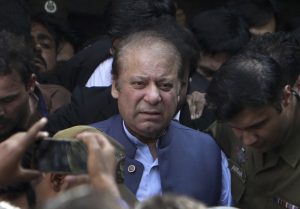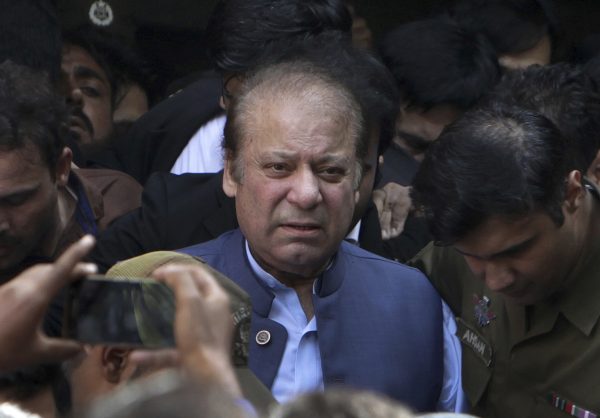
Former Pakistani Prime Minister Nawaz Sharif leaves a court in Lahore, Pakistan, on Oct. 8, 2018.
Credit: AP Photo/K.M. Chaudary, File
The return of three-time former Prime Minister and Pakistan Muslim League-Nawaz (PML-N) supremo Nawaz Sharif to Pakistan later this month after four years of self-imposed exile in London raises intriguing questions about the state of political normalcy in the country.
Following the Panama Papers scandal in 2018, which revealed a web of corruption and offshore accounts involving prominent individuals from around the globe, Sharif was found guilty of corruption and imprisoned in Pakistan. However, months after his imprisonment, local courts allowed him to leave the country supposedly for medical treatment abroad.
For years, the PML-N has vehemently denied any wrongdoing and accused the former leadership of the country’s powerful security establishment of conspiring against him to end his political career.
Sharif’s decision to return to Pakistan suggests a fair level of confidence among political forces regarding the upcoming elections’ inclusiveness and fairness. His return signifies a potential shift toward a more inclusive political landscape, where a party that claims its mandate was stolen in the 2018 general elections will potentially have an equal opportunity to participate in the polls.
Diplomat Brief
Weekly Newsletter
Get briefed on the story of the week, and developing stories to watch across the Asia-Pacific.
Get the Newsletter
Apparently, Sharif’s return is not part of any deal with the current leadership of the security establishment. Last week, interim Prime Minister Anwaarul Haq Kakar dismissed the impression that the PML-N supremo’s decision to return to Pakistan was a part of any compromise with his government. “The caretaker government has no soft corner for PML-N or any other political party … how can a caretaker government strike such a deal?” the premier told reporters.
However, critics say that Sharif wouldn’t have decided to return to Pakistan without striking a deal. The reasoning holds weightage in Pakistan where the powerful military has been accused of playing an influential role in the political arena.
Even if a deal paved the way for Sharif to return to Pakistan, it would be beneficial to the country. Pakistan’s politics have been deeply polarized, especially in recent years. For the country’s divisions to heal and for its political system to emerge from uncertainty, it is crucial that political normalcy first returns.
Sharif’s return may allow him to argue his cases on merit with a sense of confidence that he will not be harassed or victimized. It is important to note that in addition to his old conviction, Sharif is still barred from participating in elections and it remains to be seen if the court will grant him relief upon his return.
Advertisement
The interim government has stated that all political parties, including the Pakistan Tehreek-e-Insaf (PTI), are allowed to take part in elections and that neither party members nor the party itself are subject to any restrictions. The PTI has argued in the past that it has been unfairly targeted politically.
The PTI’s relentless attacks on state institutions, its attempts to undermine the role of the Parliament, and the use of street force to destabilize the system, have divided the party. Splinter factions are going their separate ways to participate in elections.
Nevertheless, it is encouraging to see that the party will be able to run in elections and that it will not refuse to participate in the system. As for PTI chief Imran Khan, he could be sentenced to a significant amount of time behind bars for using a secret diplomatic cipher for personal advantage.
In any case, the development regarding Sharif’s return is crucial for the democratic process, as it indicates a willingness from key stakeholders to engage in healthy competition and uphold democratic principles. The current military establishment also seems unwilling to rekindle old battles with Sharif and let him fight for political office. Despite PTI’s provocations over the past few months, the establishment reacted calmly and showed restraint, a sign that the state is returning to finding ways and supporting processes to get the country and its economy working again.
By returning to Pakistan, Nawaz Sharif is expressing confidence in Pakistan’s democratic system and in the belief that he won’t be treated unfairly. His return home symbolizes the possibility of political normalcy returning to the country.

